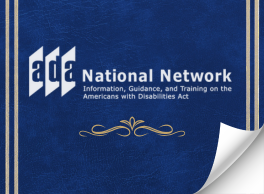

Seasons Greetings and Happy New Year,
2025 was an interesting and challenging year for all of us. However, through it all, we have remained proud of the fact that we continue to promote compliance with the Americans with Disabilities Act (ADA) and assist covered entities and individuals with disabilities and their family members to better understand their rights and responsibilities under the law. We could not have done it without the support that you have shown our organization and those that we partner with.
As we prepare for a new year, we invite you to check out our upcoming January webinars and take a look at this issue’s review of ADA and disability rights milestones, memorials, publications and resources from 2025.
Thank you for supporting the Great Lakes ADA Center in 2025. We look forward to connecting with you again in our 2026 February issue. Stay tuned!
Great Lakes ADA Center Staff


YouTube Videos:
Research:


Important Note: News from third-parties may be subject to change or require a subscription to view. The Great Lakes ADA Center is not responsible for content restrictions or changes made by third-parties.

